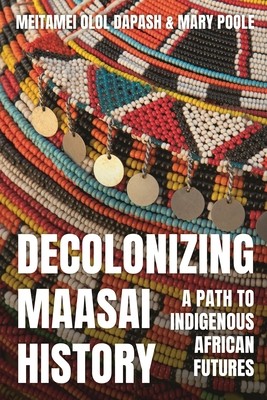
- We will send in 10–14 business days.
- Author: Meitamei Dapash
- Publisher: Zed Books
- ISBN-10: 1350427446
- ISBN-13: 9781350427440
- Format: 15.6 x 23.4 x 1.6 cm, kieti viršeliai
- Language: English
- SAVE -10% with code: EXTRA
Reviews
Description
Among Western historians, it remains common to deny the historical existence of the Maasai as a people with a dense and complex culture and polity. Within Kenya, this denial is used to rationalize the continued seizure and occupation of Maasai land, which is key to the extractive agendas of the Kenyan state. This denialist version of the history is flatly contradicted by the colonial sources through which it was built, as well as by the Maasai's own rich and deep oral history, which it ignores. However, as Maasai exist far from the centers of knowledge production empowered to define them, it has largely remained unchallenged.
Until now. Here the prominent Maasai leader and activist Meitamei Dapash, along with the Maasai people he represents, teams with renowned historian Mary Poole to offer the Maasai side of the story. Through their rich and detailed narrative, we learn not only about the history of the Maasai as they understand it, but also about the politics of Western history; about the specific ways that historical study was used as a weapon against Maasai people; about the untold history of Kenya both pre- and post-nationhood; about why the creation of nation-states is not synonymous with liberation; and about how and why Indigenous approaches to land obstruct global processes of resource extraction. Ultimately, what is offered is not only a new version of Maasai history, but also a new, clearly articulated case for how the lens of settler colonialism upends received narratives of post-"independence" Africa and offers opportunities for the emancipation of Indigenous communities from neo-colonial regimes the world over. For its groundbreaking new insights into Maasai history and its bold interventions into Indigenous studies more broadly, Decolonizing Maasai History is a must-read for scholars and students of African studies and Indigenous studies, as well as for Maasai and other Indigenous peoples fighting for decolonization.EXTRA 10 % discount with code: EXTRA
The promotion ends in 24d.01:22:31
The discount code is valid when purchasing from 10 €. Discounts do not stack.
- Author: Meitamei Dapash
- Publisher: Zed Books
- ISBN-10: 1350427446
- ISBN-13: 9781350427440
- Format: 15.6 x 23.4 x 1.6 cm, kieti viršeliai
- Language: English English
Among Western historians, it remains common to deny the historical existence of the Maasai as a people with a dense and complex culture and polity. Within Kenya, this denial is used to rationalize the continued seizure and occupation of Maasai land, which is key to the extractive agendas of the Kenyan state. This denialist version of the history is flatly contradicted by the colonial sources through which it was built, as well as by the Maasai's own rich and deep oral history, which it ignores. However, as Maasai exist far from the centers of knowledge production empowered to define them, it has largely remained unchallenged.
Until now. Here the prominent Maasai leader and activist Meitamei Dapash, along with the Maasai people he represents, teams with renowned historian Mary Poole to offer the Maasai side of the story. Through their rich and detailed narrative, we learn not only about the history of the Maasai as they understand it, but also about the politics of Western history; about the specific ways that historical study was used as a weapon against Maasai people; about the untold history of Kenya both pre- and post-nationhood; about why the creation of nation-states is not synonymous with liberation; and about how and why Indigenous approaches to land obstruct global processes of resource extraction. Ultimately, what is offered is not only a new version of Maasai history, but also a new, clearly articulated case for how the lens of settler colonialism upends received narratives of post-"independence" Africa and offers opportunities for the emancipation of Indigenous communities from neo-colonial regimes the world over. For its groundbreaking new insights into Maasai history and its bold interventions into Indigenous studies more broadly, Decolonizing Maasai History is a must-read for scholars and students of African studies and Indigenous studies, as well as for Maasai and other Indigenous peoples fighting for decolonization.

Reviews